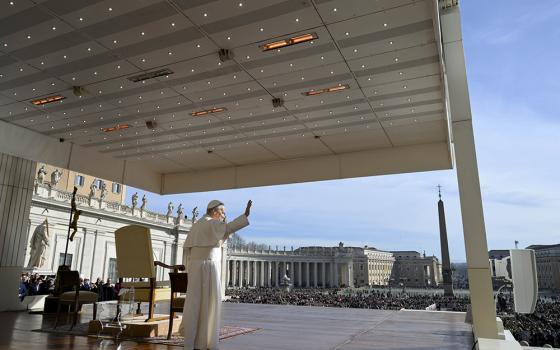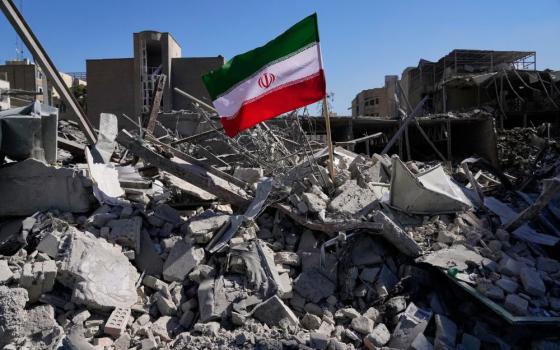
A man walks next to an anti-Israel billboard on a street in Tehran, Iran, June 24, 2025. President Donald Trump announced on social media June 23 that Israel and Iran reached a ceasefire agreement after 12 days of war, however both sides accused the other of violations in the hours afterward. (OSV News/West Asia News Agency via Reuters/Majid Asgaripour)
War and the moral life are never compatible. The loss of human life in war, not just civilian life but the lives of military personnel also, is always the loss of unique and irreplaceable human beings. The moral law demands that every person strive for peace, especially those charged with guiding the destiny of nations.
In a fine essay at Religion News Service, Mark Silk, the longtime director of the Greenberg Center at Trinity College, where I was a visiting fellow, poses the question: Was it moral to bomb Iran? He questioned whether Pope Leo XIV really believed what he was saying when, during Sunday's Angelus, the new pope said: "War does not solve problems, but rather it amplifies them and produces deep wounds in the history of people that take generations to heal. No armed victory can compensate for the pain of mothers, the fear of children, the stolen future."
Silk points to the American Civil War and World War II as just wars that solved the problems of slavery and Nazism respectively, and to the war in Ukraine as a just resistance against aggression.
All this is to say that history provides different lessons from those the moral law affords. History teaches us that sometimes war is necessary. Abolitionist sentiments and moral exhortations did not end chattel slavery in the United States. The abolitionists drove a nation to confront the evil in its midst by going to war to prevent extending that evil into new territories, and the war ended slavery.
The Civil War did not cohere neatly with theological notions of justice and peace either. Yet, it produced the finest theological statement made by any American in the 19th century and by any president at any time. In his second inaugural address, after noting that both sides in the war "read the same Bible and pray to the same God," Abraham Lincoln said:
Fondly do we hope — fervently do we pray — that this mighty scourge of war may speedily pass away. Yet, if God wills that it continue until all the wealth piled by the bondsman's two hundred and fifty years of unrequited toil shall be sunk and until every drop of blood drawn with the lash shall be paid by another drawn with the sword as was said three thousand years ago so still it must be said "the judgments of the Lord are true and righteous altogether."
It would have been better for the human race if slavery had never been introduced. It would have been better for the human race if, having begun, slavery had ended because the demands of justice were so obvious as to make ending it obvious. In fact, it took a war to end it. "The judgments of the Lord are true and righteous altogether."
Advertisement
Silk rightly points to the Greek fathers who, even better than Augustine, captured the moral conundrum posed by war. "Recognizing that, in a fallen world, warfare is sometimes warranted, they nevertheless held to the early Christian position that killing is always bad and recommended that soldiers who kill even in a warranted war avoid taking Communion for three years," he writes.
Professor Tobias Winright analyzed this difficult balance in a paper, "Just War Theory, Moral Injury and the War in Ukraine," that he delivered at the 2023 seminar on Catholic social doctrine sponsored by Sacred Heart University's Center for Catholic Studies and the U.S. Conference of Catholic Bishops.
It is impossible yet to know if the Israeli and U.S. airstrikes obliterated Iran's nuclear potential. We can all hope it did.
A wise friend pointed out to me that we believers all believe some things that strike others as strange, even incredible, such as our Christian belief that a man rose from the dead. But we truly believe that. The theocratic mullahs in Iran truly believe that Israel should be destroyed. If Israeli intelligence concluded that the theocratic regime was moving forward with its nuclear weapons program — and Israeli intelligence was able to pinpoint the location of top military leaders in Iran — it is difficult to deny they had a moral right to attack.
Unlike conventional weapons, for nuclear weapons the key moral threshold is not deployment but acquisition. Does anyone doubt that the world would be safer today if someone had done to the North Korean nuclear facilities what Israel and the U.S. did to Iran's?
The U.S. attacks were not existentially necessary for ourselves but they helped protect our allies. When our B-2 bombers dropped their bunker-busting bombs on three nuclear sites, it was not only the Israelis who rejoiced, but the Saudis and other Arab rulers, too.
There is a measure of moral presumption in favor of actions that support a nation's allies, but only a measure. The risk of civilian casualties or of escalation must be weighed in the balance, too, and both counseled against the U.S. strikes. Thankfully, Iran signaled its intention to avoid escalating the conflict when it gave advance notice of its launching 10 missiles at a U.S. base in Qatar.

Interceptor missiles are fired, after Iran's armed forces say they targeted the Al-Udeid base in a missile attack, as seen from Doha, Qatar, June 23, 2025. (OSV News/Reuters/Stringer)
Former Secretary of State Anthony Blinken is right to argue that in 2015 the U.S. and Europeans had negotiated a stoppage to Iran's enrichment program, and that Trump tore that up in 2018. "Mr. Trump, in essence, is now trying to put out a fire on which he poured gasoline," Blinken writes.
He also states: "Now that the military die has been cast, I can only hope that we inflicted maximum damage — damage that gives the president the leverage he needs to finally deliver the deal he has so far failed to achieve."
Back to Leo. The problem is not that he has forgotten the lessons of history. His problem is the problem of the modern papacy. As I wrote when criticizing Pope Francis' stance on the war in Ukraine: "We want a pope who articulates moral issues, but no one wants a pope who advocates war or who chooses one part of the human family over another."
The spiritual tasks of providing moral clarity and urging the human race to seek peace are sometimes in conflict, at least to us humans.
Depending on what we subsequently learn about the effectiveness of the raid, I have no moral qualms with the airstrikes Trump ordered. But all Americans should be alarmed about one political decision he made: The president briefed congressional Republican leaders about the strikes, but not the Democratic leaders. That is not the kind of failure that sparks a populist movement, but it is the kind of failure that alters our constitutional fabric.
Briefing congressional leaders is a nod to the fact that the Constitution vests the authority to declare war in Congress, not the presidency. Doing so on a bipartisan basis reflects the fact that it is the nation that goes to war, not one party.
It appears that the airstrikes have not resulted in an escalation, at least not immediately. But what if they had? Military exercises always involve risk. When our men and women in uniform abroad face those risks head-on, they need to know they have the country behind them, not merely one party. Blinken was right to use the pronoun "we" in describing his hopes for the country today.
There will be much foolishness written and spoken in the days ahead. Trump supporters will confuse the successful strikes with the eschaton and Trump detractors will refuse to acknowledge that eliminating or even severely degrading Iran's nuclear program is a good thing. Might continued diplomacy have achieved the same result? Perhaps, but history is filled with might-have-beens.





